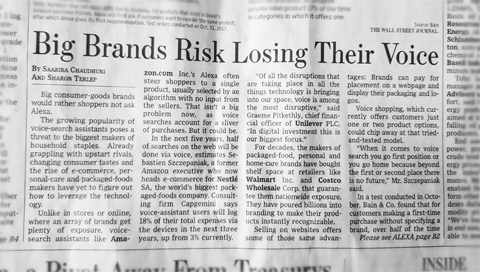On WSJ’s “Big Brands Risk Losing Their Voice” – Original Article
When we started GimmeAnother about 5 years ago, we posited that there was a large and kinda obvious efficiency that was being left on the table by online retailers. In a nutshell, online shopping was still defined by a standard checkout routine, a process that was the same for both new orders and orders that should be recurring. Or, to put it plainly: the checkout process was exactly the same for the purchase of an expensive durable good, like refrigerator, as it was for consumers who regularly returned for refills of vitamins, diapers, or contact lenses. To a great extent, many major retailers retain this complexity in their checkout and re-order processes to this day – even for recurring orders from their most loyal customers – as they try to beat (or simply compete with) Amazon at a game that the book-store turned everything-store monolith has largely perfected. The race to be present in voice re-order by Amazon’s Alexa is the latest in their set of hurdles.
It always struck me, though, that beyond the traditional brick and mortar retailers, regional grocers, and pharmacy chains that would inevitably be hit hard by Amazon – and indeed they were, are, and will be still – the largest long-term overall loss of core value might, in fact, be among by established household brands that can no longer found an easy home on the end-caps at Target and Walmart. Simply put, as Amazon drove prices down, and made home-delivery a snap, large box retailers like Target and Walmart would prioritize in-house brands (like ‘Up and Up’) over well-known staples like Tide or Cascade. The goodwill and name recognition that had taken decades to build would start to erode. Amazon’s success with the Alexa voice assistant, of course, has made it all an even more difficult equation as Amazon is now set to control the distinction between actual product type and the priority of brand that ends up in your cart via Alexa. You can count on receiving Amazon-brand batteries before Duracell unless you specify.
While it’s hard to know exactly where CPGs (Consumer Packed Good) behind these “big brands” might choose start a relationship with the end consumer, it does boggle the mind a bit to think that in the first 20 years of the internet, they’ve not found a way to give it an earnest try. As per the attached WSJ article, CPGs that continue to rely on retailers – and now retailers voice assistants like Alexa – as their sole channel for communication with the end consumer are sure to lose additional cachet with consumers and presence in the digital end-caps and aisles of the future.
– Jon Roketenetz
Jon is the CEO of GimmeAnother and founder of 3VERB.

